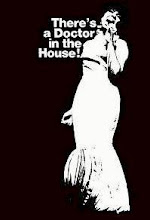Before the Inspirations, Part II
Welcome back to my little (hi)story of the Sweet Inspirations! We have reached the third part ... and are still far away from the actual story of the Inspirations, that is, the Inspirations as they became known to the world from 1967 onwards. But as their history is deep-rooted, there is history before history here. And the story I am continuing here does concern one member of the Inspirations-to-be, namely Emily »Cissy« Drinkard, better known as Cissy Houston (and mother of Whitney).
 |
| RCA Victor # LPM 1856 (1958) |
It is a very accomplished gospel album, though, and somehow you feel that here is a family singing. The LP, released in November '58, received a benevolent, if as usual generic-sounding, review in Billboard (Nov. 24, p. 30): The Drinkards are seven - five fems [!] and two men, who know their way around gospel material ... wonder- ful selections, all of which are offered with great zest, verve and devotion. Judy Guions takes the driving lead in many cases and she's highly effective. ... A fine entry for the market. (A nice example of Billboard-prose!) However, in general this is correct, and Judy Guions deserved to be singled out.
More interesting, and to the point, is what we are offered on the back cover of the album. The back cover notes were written by Joe Bostic who had taken the Drinkards under his wing, mainly at the instigation of Mahalia Jackson; Bostic was at the time (i.e. in 1958) gospel music director of WEVD radio and WNTA-TV, New York. Here is the gist of what he wrote for the RCA album:
The seven singers and musicians who comprise the Drinkard Singers are, with one exception, all brothers and sisters. The exception is hard-driving Judy Guions, the youngest member of the troupe. Judy is the adopted daughter of Lee Warrick, oldest sister and leader of the group.The songs were recorded in Webster Hall, NYC, April 1958. And Bostic was right in many a respect: The songs on this album are infectious and well-arranged, and the Drinkards certainly are versatile. Therefore it was hard to select two songs from this album. In the end I opted for two spirituals. The first, »One Day«, because it is unknown to me except from this LP. There are other tunes called »One Day« but they are not identical with the song the Drinkards recorded as far as I could establish; also the lyrics are plainly different. I am grateful to any of you for more information about this song. I chose the second song, »After It's All Over«, because it shows most clearly how the Drinkard Singers were able to render known standards in a fresh way and make these songs their own. This second tune was composed by Alex Bradford in 1953 and recorded by several other known gospel groups, e.g. the Roberta Martin Singers. The Drinkard Singers, in any case, did a great job with both songs! Listen here:
The hallmark of this exceptional singing ensemble is tremendous power and drive coupled with infectious, bouncy rhythmic ideas. The group's versa- tility enables it to sing many types of songs, but their forte is novel arrange- ments of standard spirituals. ...
In gospel music circles the Drinkard Singers are recognized as "singers' singers." Although they live all in Newark, New Jersey and are products of that city's Southside High School, their deep feeling for folk music and their religious conviction can be traced to their family heritage. ... The Drinkard Singers enjoyed a modest popularity in their New Jersey environs, until they were discovered by the great Mahalia Jackson when she heard them on a small Newark radio station. Miss Jackson immediately brought them to my attention and I promptly engaged them as regular fixtures of my weekly TV gospel show. They were later presented at Carnegie Hall along with Miss Jackson, and it was at her suggestion that the Drinkards were invited to participate at the 1957 music festival in Newport. Their instantaneous suc- cess at the festival resulted in their being signed on the spot by Herman Diaz, Jr., for RCA Victor. This album is the outcome of that action and Mahalia Jackson's continuing co-sponsorship.
The Drinkard Singers: »One Day« / »After It's All Over« from the RCA LP »A Joyful Noise« (1958):
To be continued ...















No comments:
Post a Comment